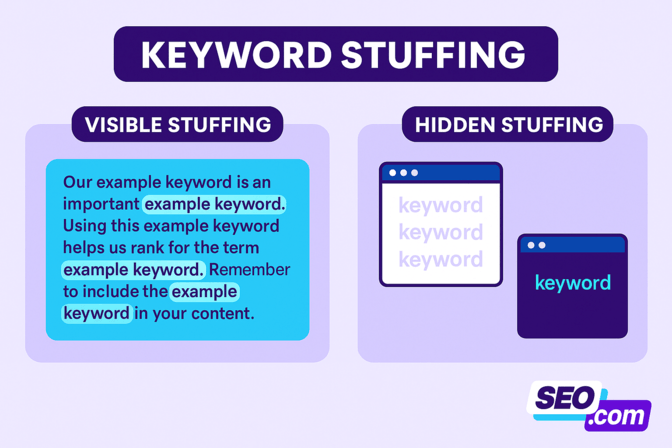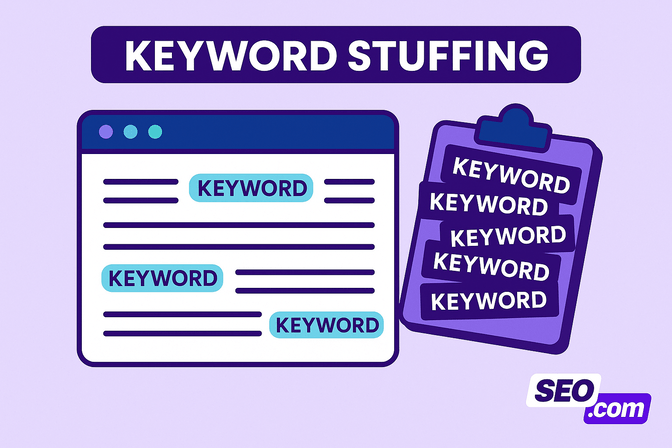Got keywords? If you’ve got too many, you might be keyword stuffing. What is keyword stuffing? In search engine optimization (SEO), keyword stuffing is when you repeatedly use the same keyword (or phrase), affecting the content’s readability and usability.
Learn more about keyword stuffing’s meaning now!
What is keyword stuffing?
Keyword stuffing is the overuse of a word or phrase to the point where it affects the content’s readability. In SEO, keyword stuffing is considered a black-hat SEO practice and violates Google’s spam policies for search.
Where did keyword stuffing come from?
In the early days of search engine optimization, webmasters discovered that search engines depended heavily on keywords to determine a URL’s relevance to a user’s search.
The result? Keyword stuffing.
Webmasters could place keywords here, there, and everywhere, and rank well for the targeted terms. Of course, search engines like Google caught on and pushed updates like Panda to resolve the issue.
While not as common as before, keyword stuffing still happens in SEO (whether intentionally or unintentionally).
Is keyword stuffing an SEO ranking factor?

“Our spam policies help protect users and improve the quality of search results. To be eligible to appear in Google web search results (web pages, images, videos, news content or other material that Google finds from across the web), content shouldn’t violate Google Search’s overall policies” (Source)
Keyword stuffing is considered an SEO ranking factor because it violates Google’s spam policies. According to Google, eligibility for appearing in search results begins with not violating its spam policies, which include keyword stuffing, cloaking, hidden text, link spam, and more.
What are the types of keyword stuffing?
Let’s expand on keyword stuffing’s definition by exploring the two types of keyword stuffing:

Visible
Visible keyword stuffing is when the “stuffing” is visible to users. You can see an example of this below:
“Expedite your mornings with aluminum coffee pods. With these aluminum coffee pods, making coffee becomes fast and easy. Purchase your aluminum coffee pods today and bring more sunshine to your mornings!”
In the example above, we’re keyword stuffing with aluminum coffee pods.
Another keyword stuffing example is when businesses purchase backlinks and request specific anchor text. For instance, the company selling those aluminum coffee pods may request all purchased backlinks to that page use the anchor text, “aluminum coffee pods.”
For Google (and other search engines), this strategy looks spammy and can hurt your site’s and the referring site’s search performance.
Hidden
Hidden keyword stuffing is when the “stuffing” is invisible to users. People will hide keywords by:
- Matching text and background colors
- Placing text behind images
- Positioning text off-screen
- Using small, unreadable font sizes
With this black-hat SEO tactic, users don’t “see” the keywords, but search engines do. Previously, this tactic was effective for ranking in organic search results, but search engines have become skilled at detecting this spammy practice.
Why is keyword stuffing in SEO bad?
Keyword stuffing in SEO is bad for a few reasons, including the following:
Violates spam policies
First, you’re violating Google’s spam policies when you keyword stuff.
If you’re banned from Google’s index, you’re banned from Google search results.
That alone should be reason enough not to overuse keywords in your content (or hide keywords on your site) because Google can ban your website from its index for these violations.
If you’re banned from Google’s index, you’re banned from Google search results.
Uses black-hat SEO
Second, keyword stuffing is a black-hat SEO practice, meaning it’s an unethical SEO practice. While some webmasters find success with black-hat SEO tactics, search engines like Google are updating their algorithms hundreds of times each year to diminish the returns of these tactics.
Affects user experience
Third, visible keyword stuffing affects the user experience. No one enjoys reading repetitive content, which is what keyword overuse creates. In response, users might bounce from your website and avoid your content in the search results later.
Diminishes brand perception
Fourth, keyword stuffing influences what people think of your brand. For example, viewers might think your brand doesn’t know what it’s talking about, which can remove your business from their considerations in choosing a service or product provider.
Overall, there are zero benefits to keyword stuffing in SEO today.
Lowers search rankings
You’ll also notice lower rankings in search results when you overuse keywords in content. Whether you’re tracking rankings manually or with a rank tracking tool, you’ll notice your content doesn’t appear on the first page of Google or other search engines.
When that happens, you miss achieving your SEO goals, like generating qualified traffic.
How to avoid keyword stuffing in SEO
Keyword stuffing in SEO isn’t exclusive to black-hat SEOs — beginner and seasoned SEOs unintentionally overuse keywords in their content. While their intentions are good (to show relevancy to users), the results aren’t.
So, here are some ways to avoid keyword stuffing:
Read your content aloud
Before publishing your content, read your content aloud. If you don’t feel like reading your content aloud yourself, use Microsoft Word’s Read Aloud feature. There are also plenty of free tools that you can use for this purpose.
If you don’t feel like reading your content aloud yourself, use Microsoft Word’s Read Aloud feature.
Reading your content aloud will help you find instances where your keywords affected readability.
Review your keyword instances

Another trick we like to use is Ctrl+F, which lets you search a document for a word or phrase.
Here, you can view a keyword’s frequency and density. For example, is the keyword’s usage condensed to the introduction, or does the keyword appear throughout the page with plenty of spacing between insertions?
Based on your findings, you remove or adjust keyword appearances.
Check your content’s readability
Testing your content’s readability with a free tool like Hemingway Editor can also help you spot keyword stuffing. With this free tool, you copy and paste your content, and the app scores its readability and highlights where you can improve the content’s readability.
Put your audience first
You can also avoid keyword stuffing in SEO by emphasizing your target audience. Write from an audience- vs. SEO-first perspective, and you’ll likely find yourself inserting keywords less than when writing as an SEO.
Earn your backlinks
Don’t pay for backlinks.
While it seems like a quick answer to one of the most challenging parts of SEO, it’s a decision with long-lasting effects. From getting hit in an algorithm update to getting banned from Google’s index, there are several second-order effects to buying backlinks.
Instead, earn your backlinks through white-hat tactics, like:
- Producing content with third- or first-party data
- Creating interactive tools and quizzes
- Promoting content online through social media, email, or even paid ads
Wipe out keyword stuffing from your SEO strategy
You’ve learned what keyword stuffing is in SEO. Now, start wiping keyword stuffing from your SEO strategy. With the above tips, you can begin taking a user-first approach to search engine optimization that aligns with Google’s goals for organizing the web’s content.
Need help with keywords and SEO? Contact us online today to get started!
Writers

Related Resources
- What is Google Trends?
- What is Keyword Clustering? Learn the Basics with SEO Pros
- What is Keyword Difficulty? (And How to Use Keyword Difficulty for SEO)
- What is Keyword Ranking?
- What is Link Building? Your Guide to Quality Link Building
- What is Robots.txt File? Learn the Basics with SEO Pros
- What is Search Intent? + How to Determine It
- What is SEO? Learn the Essentials of Search Engine Optimization
- What is SSL and Why Do I Need It for My Website?
- Google Tag Manager: What is It, and What Can It Do?


